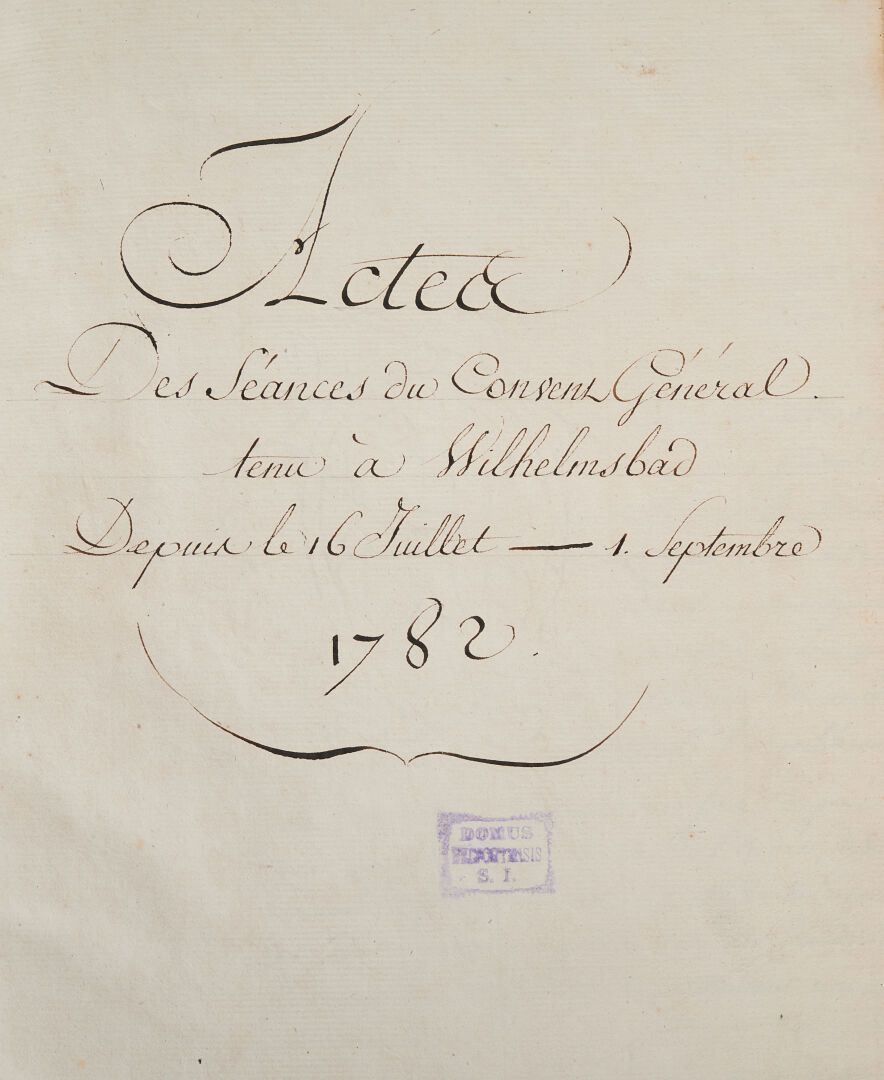Description
CONVENT OF WILHELMSBAD. - MANUSCRIT entitled "Actes des séances du Convent général tenu à Wilhelmsbad depuis le 16 juillet [jusqu'au] 1. septembre 1782". [1782]. In-folio, bradel blue boards with handwritten label on spine (contemporary binding). 323 pp. in-folio. Detailed minutes indicating those present, speakers, motions, votes, quoting or summarizing the ideas expressed. EXAMPLE WITH AUTOGRAPHIC SENDER SIGNED BY BERNARD-FREDERIC DE TURCKHEIM ("F. Bernhardus a Navibus" according to his Order name) as acting Chancellor of the Fifth Province (Burgundy) of the Strict Observance, addressed to the Strasbourg Prefecture of this Regime. ATTACHED, a handwritten copy of the capitulation of Duke Ferdinand of Brunswick-Lunebourg, Grand Master of Scottish Freemasonry of the Templar Strict Observance, dated Wilhelmsbad August 28, 1782, with handwritten dispatch to the Templar Prefecture of Strasbourg. THE FIRST ATTEMPT AT A UNIVERSAL OVERHAUL, AND THE BIRTH CERTIFICATE OF THE RECTIFIED SCOTTISH REGIME. At a time when the Masonic system of the Strict Observance Templar was in crisis, the Duke of Brunswick, who headed it, was struck by the success of the Convent des Gaules, held in 1778 at the instigation of Jean-Baptiste Willermoz, who effectively defended a rectified Templar system based on a transcendent Catholicism inspired by the ideas of Martines de Pasqually and Claude de Saint-Martin. Convinced by Willermoz's reformist ideas, the Duke of Brunswick convened a convent in Wilhelmsbad, which ran from mid-July to early September 1782. Although the Convent was exclusively concerned with French and German Masonry, it went down in history as the first attempt at a universal overhaul. In debates in which Baron Jean de Turckheim played a major role, various tendencies were expressed, notably that of the Philalèthes, through the voice of the Marquis de Chefdebien, emissary of the Marquis de Savalette. Willermoz's system was nonetheless adopted, albeit with a few modifications, under the name of the Ordre des Chevaliers Bienfaisants de la Cité Sainte. Although it never really took hold, the Rectified Scottish Regime often had a decisive influence over the following century and a half. Provenance: Jesuit establishment in Belfort (ex-libris stamp).
56
CONVENT OF WILHELMSBAD. - MANUSCRIT entitled "Actes des séances du Convent général tenu à Wilhelmsbad depuis le 16 juillet [jusqu'au] 1. septembre 1782". [1782]. In-folio, bradel blue boards with handwritten label on spine (contemporary binding). 323 pp. in-folio. Detailed minutes indicating those present, speakers, motions, votes, quoting or summarizing the ideas expressed. EXAMPLE WITH AUTOGRAPHIC SENDER SIGNED BY BERNARD-FREDERIC DE TURCKHEIM ("F. Bernhardus a Navibus" according to his Order name) as acting Chancellor of the Fifth Province (Burgundy) of the Strict Observance, addressed to the Strasbourg Prefecture of this Regime. ATTACHED, a handwritten copy of the capitulation of Duke Ferdinand of Brunswick-Lunebourg, Grand Master of Scottish Freemasonry of the Templar Strict Observance, dated Wilhelmsbad August 28, 1782, with handwritten dispatch to the Templar Prefecture of Strasbourg. THE FIRST ATTEMPT AT A UNIVERSAL OVERHAUL, AND THE BIRTH CERTIFICATE OF THE RECTIFIED SCOTTISH REGIME. At a time when the Masonic system of the Strict Observance Templar was in crisis, the Duke of Brunswick, who headed it, was struck by the success of the Convent des Gaules, held in 1778 at the instigation of Jean-Baptiste Willermoz, who effectively defended a rectified Templar system based on a transcendent Catholicism inspired by the ideas of Martines de Pasqually and Claude de Saint-Martin. Convinced by Willermoz's reformist ideas, the Duke of Brunswick convened a convent in Wilhelmsbad, which ran from mid-July to early September 1782. Although the Convent was exclusively concerned with French and German Masonry, it went down in history as the first attempt at a universal overhaul. In debates in which Baron Jean de Turckheim played a major role, various tendencies were expressed, notably that of the Philalèthes, through the voice of the Marquis de Chefdebien, emissary of the Marquis de Savalette. Willermoz's system was nonetheless adopted, albeit with a few modifications, under the name of the Ordre des Chevaliers Bienfaisants de la Cité Sainte. Although it never really took hold, the Rectified Scottish Regime often had a decisive influence over the following century and a half. Provenance: Jesuit establishment in Belfort (ex-libris stamp).
